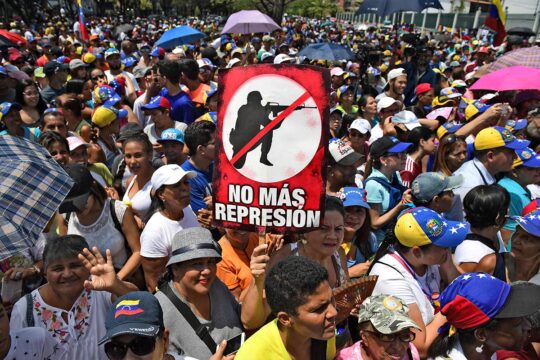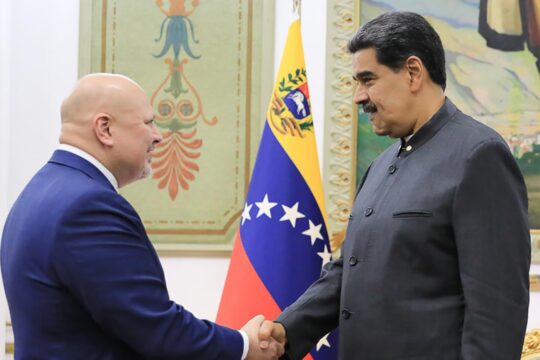It takes guts as well as a strong stomach to do Baldomero Hidalgo's job: he shows up to work at a Caracas funeral home when even the families of the dead are too scared to come.
In one of the most dangerous cities in the world, he carries on embalming the corpses of shooting victims where other funeral parlors have shut down in fear.
By doing so, he risks ending up in a coffin himself.
Gang members' rivals come and shoot the deceased's friends at wakes. Other times, relatives rally outside the funeral home shooting in the air in homage to their dead comrade.
"It is a high-risk job," said Baldomero, 32. If he messed with the dead gang members' companions, he feared, "I would get a bullet for free."
Hidalgo's parlor stands near a stinking rubbish tip in a rough district of one of the most dangerous cities in the world.
He estimates that about 24 of the 30 people he embalms each month are killed by firearms.
"If they are shot in the face, you just have to do the best job you can," he said. "But there are some shooting victims you can't do anything for."
Those get put in a closed coffin for the wake.
He often has to take the shrouded body to the victim's family's home.
With regular gunfights between gangs, the families are too afraid to come out for fear of revenge shootings at the funerals.
Many funeral homes in Caracas have stopped accepting gun victims because shootings at wakes have increased, says Jose Morillo, president of the Funeral Industry Professionals' Association.
"There are groups who don't accept being turned away," he said. "They come and make a big song and dance and fight. It's not safe."
- Violent crisis -
Up to 40 corpses are brought into the Caracas public morgue each weekend, according to a toll published each Monday by the press.
The state prosecution service estimates that there were nearly 18,000 homicides in Venezuela in 2015: about 58 for every 100,000 inhabitants.
The Venezuela Violence Observatory, a non-government group, estimates that the rate is much higher: about 90 per 100,000.
The prosecutors' estimate excludes certain cases, such as people killed during police operations.
Venezuela is in a political and economic crisis sparked by a plunge in prices for its crucial oil exports.
- Gangster wakes -
As Baldomero sits at his desk, a young man with a tired face paces nervously outside in the corridor.
He says his brother was shot dead the night before. He is waiting for the funeral parlor to prepare the body.
But the trouble does not always end with the victim's burial, Baldomero said.
When the victim is a gang member, his companions stage an informal wake.
They block the entrance to the funeral home with their motorbikes, get drunk and high and fire their guns in the air.
"That gets out of hand, because most of them are armed. The police are conspicuous by their absence," said Baldomero.
Big funeral parlors have a protocol in place for refusing to accept a body.
At the small establishment where Baldomero works, he finds himself unable to say no despite the risk.
He has had a gun pointed at him and was even abducted once by the grieving family of a young man who was shot.
They seized him as he was on the way to the cemetery with the body and made him drive the hearse to a hill where they had a wake prepared.
The gang members saw off their dead companions by shooting in the air, racing on their motorbikes and playing music.
They did it in a remote location for fear of getting shot by rivals if they went to the cemetery.
Baldomero had to wait around for hours before they let him take the body to the cemetery.
- Chronicle of deaths counted -
At the offices of El Universal, Venezuela's leading newspaper, crime reporter Deivis Ramirez is updating his "red list."
With information from officials, police, neighborhood associations and fellow reporters, he adds daily to his tally of homicide victims.
He says his investigations have earned him death threats.
Ramirez published a book about the killing of the Venezuelan beauty queen Monica Spear in 2014.
A relative of one of the suspects threatened to make the reporter end up "with flies in his mouth."
Venezuelan newspapers have been publishing regular body counts since 2010, when authorities stopped releasing regular official data.
"For me a dead person is more than just a number," Ramirez said.
"He may be the meanest villain, but his mother still suffers."


